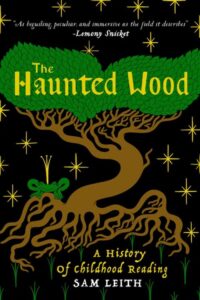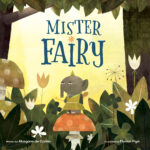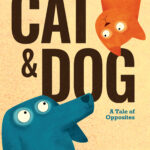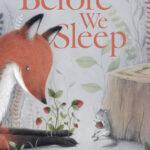Publishing Talks Interview with Ken Whyte of Sutherland House
October 22, 2024 by David
Filed under Publishing History, PublishingTalks, The Future
 I began Publishing Talks a number of years ago as a series of conversations with book industry professionals and others involved in media and technology. Most of these interviews originally involved the future of publishing, books, and culture, talking with people in the book industry about how publishing is evolving in the context of technology, culture, and economics.
I began Publishing Talks a number of years ago as a series of conversations with book industry professionals and others involved in media and technology. Most of these interviews originally involved the future of publishing, books, and culture, talking with people in the book industry about how publishing is evolving in the context of technology, culture, and economics.
Later this series broadened to include conversations to go beyond the future of publishing. In an effort to document the literary world, I’ve talked with a variety of editors, publishers and others who have been innovators and leaders in independent publishing in the past and into the present.
These conversations have been inspirational to me on many levels. I have gotten to speak with visionaries and entrepreneurs, as well as editors and publishers who have influenced and changed contemporary literature and culture. I’ve also had the opportunity to speak with a number of friends and colleagues I have met or worked with during the many years I have been in the book business.
More recently, I’ve been talking to book folks about what is going on in publishing today, quite often about the changes in marketing and promotion that have marked all media industries as social media has overwhelmed traditional media, creating an extremely complex and constantly changing environment.
One thing is certain about publishing – there are no final answers, but there are many really important questions that we should be asking all the time.
I recently had the opportunity to (virtually) meet and talk to Kenneth (Ken) Whyte, founder and president of the Toronto based Sutherland House publishing company. I discovered Ken through his excellent and thoughtful newsletter called SHuSh, where he writes about a wide range of book industry matters as well as people and books he is connected to or has published. Ken started in journalism and magazine writing and publishing, wrote nonfiction books himself, and then started Sutherland House. One might reasonably question why any sane person would start a commercial publishing house in the current troubled media environment, but Sutherland House appears to be successful and is clearly well run and intelligently managed. I thought it would be interesting and valuable to talk to Ken about his thinking about books and publishing. He is an innovator and clearly a smart publisher who has figured out how to sell books.
We talked about a wide range of subjects and concerns that will be of interest to anyone who follows current publishing and media trends. We talked about the current state of Canadian publishing, which is simultaneously similar and very different from the US publishing scene. And we talked as well about many of the challenges and opportunities that exist for publishers and authors in Canada and the USA alike. We talked about AI and its actual uses in publishing, consolidation in retail and how publishers must navigate markets, author income issues, ebooks, book pricing, changes in the overall media landscape, and much more.
From the Sutherland House website:
At Sutherland House, we believe in the power of a distinct aesthetic, and each of our publications reflects the unique essence of our brand. From inception to launch, every title undergoes meticulous market testing to ensure its resonance with our discerning readership. All of our books are simultaneously published in both Canada and the United States, supported by robust sales and distribution channels in both countries.
Kenneth Whyte was editor-in-chief of Saturday Night Magazine, founding editor of The National Post, editor and publisher of Maclean’s, president of Rogers Publishing, and founding president of Next Issue Canada. He is the author of The Sack of Detroit: General Motors and the End of American Enterprise and The Uncrowned King: The Sensational Rise of Willian Randolph Hearst.
Podcast: Play in new window | Download
Publishing Talks: Interview with Dan Harke of Mayo Clinic Press
October 5, 2022 by David
Filed under PublishingTalks, The Future
 Publishing Talks began as a series of conversations with book industry professionals and others involved in media and technology, mostly talking about the future of publishing, books, and culture. I’ve spent time talking with people in the book industry about how publishing is evolving in the context of technology, culture, and economics.
Publishing Talks began as a series of conversations with book industry professionals and others involved in media and technology, mostly talking about the future of publishing, books, and culture. I’ve spent time talking with people in the book industry about how publishing is evolving in the context of technology, culture, and economics.
Some time back, this series broadened to include conversations that go beyond the future of publishing. In an effort to document the literary world, I’ve talked with a variety of editors, publishers and others who have been innovators and leaders in independent publishing in the past and into the present.
These conversations have been inspirational to me on many levels. I have gotten to speak with visionaries and entrepreneurs, as well as editors and publishers who have influenced and changed contemporary literature and culture. I’ve also had the opportunity to speak with a number of friends and colleagues I have met over the many years I have been in the book business.
This week, I talked to Dan Harke, who manages the Mayo Clinic Press in Rochester, Minnesota. Mayo Clinic is doubtless familiar to Writerscast listeners – it is probably the best-known health care organization in America. It has 73,000 employees (including thousands of MDs) and cares for more than 1.4 million people annually. Mayo is almost always ranked as the number one hospital in the US.
For many years, Mayo Clinic licensed content to established publishers, and sold books direct to consumer only through its mail order business associated with its long-running Mayo Health Letter. Several years ago, Mayo established the Mayo Clinic Press to publish its own books, and now is in the process of growing to become a full line trade publisher, while still maintaining its mission-driven commitment to healthcare for the greater good. Aside from consumer health books, Mayo is now publishing children’s books, ebooks, audio books and podcasts, as well as its still vibrant health letter.
Dan comes to publishing from a diverse background with skills and knowledge in health care, marketing, and innovation, which gives him a very different perspective about publishing than many of us with experience mostly in trade publishing, so I think this conversation will be of interest to many Publishing Talks listeners.
You can look at MCP’s terrific website here.
In the interest of full disclosure, I want to mention that I am a consultant to MCP on trade publishing and marketing matters.
Podcast: Play in new window | Download
Publishing Talks: Interview with Angus Yuen-Killick of Red Comet Press
April 21, 2021 by David
Filed under Publishing History, PublishingTalks, The Future
 Publishing Talks began as a series of conversations with book industry professionals and others involved in media and technology, mostly about the future of publishing, books, and culture. I’ve spent time in conversation with people in and around the book industry talking about its evolution in the contexts of technology, culture, and economics.
Publishing Talks began as a series of conversations with book industry professionals and others involved in media and technology, mostly about the future of publishing, books, and culture. I’ve spent time in conversation with people in and around the book industry talking about its evolution in the contexts of technology, culture, and economics.
Later, this series broadened to include conversations that go beyond the future of publishing. In an effort to document the current and recent past of book publishing, I’ve talked with a variety of editors, publishers and others who have been innovators and leaders of all kinds, past and present.
These conversations have been inspirational to me on many levels. I have gotten to speak with visionaries and entrepreneurs, as well as editors and publishers who have influenced and changed contemporary literature and culture. I’ve also had the opportunity to speak with a number of friends and colleagues whose work has influenced my own.
One such person is Angus Yuen-Killick, whom I have known since the 1990s when he came to the US to set up an outpost for a small UK publisher I was working with at the time. I was immediately impressed with Angus’ energy, vision and intelligence and since then, he has gone on to have a great career in children’s book publishing, his true love in the book business.
After working for several larger children’s book publishers over many years, Angus has now founded his own publishing imprint, Red Comet Press, about which he says:
“This is the realization of a long-held dream. The past year has forced us to reevaluate our priorities and reflect on our future. Launching a new publishing company seemed at once a crazy proposition, but also the absolute right thing to do.
At Red Comet Press, we will focus on the craft of publishing and curating a list of hand-picked titles. We will shepherd them through the publishing process, from creator to reader, with care and attention to detail. When we acquired these first books, it was a sign. They are inventive, surprising, touching, and multi-layered—and they remind me, upon every reading, of the passion and creativity that drew me to this business in the first place.”
Angus was interviewed earlier this year in Publishers Weekly, where he said “When I first started in the business, I worked at a tiny poetry publishing company in the north of England. My dad was an editor there and I was exposed to every aspect of the publishing process. When I left Macmillan last year and was trying to figure out the next step in my career after 30 years in corporate publishing, I realized that my dream was returning to that model of shepherding a list of books from the beginning to the end. This felt like the right thing for me to do next.”
Angus has help from his husband, Michael Yuen-Killick, a talented graphic designer, who serves as creative director for Red Comet, and a raft of friends and associates drawn from his many years of publishing. During his more than thirty years in book publishing, Angus has worked in key roles at various houses, including Macmillan, Penguin, Disney, and DK. I doubt there is anyone in children’s book publishing he does not know; he is widely respected and admired by his colleagues, and by many authors and illustrators as well.
It is always stimulating and fun for me to speak with Angus, so having him as a guest here is a special pleasure. If you are interested in the particular challenges of children’s book publishing, you will learn a great deal from Angus even from this brief interview. His knowledge and experience is unmatched. His enthusiasm and intelligence are often inspirational. And the books he publishes at Red Comet are going to be fantastic too. I am really looking forward to seeing his first list of books later this year.
Podcast: Play in new window | Download
David Wilk interviews Lee Klancher of Octane Press
September 6, 2016 by David
Filed under Publishing History, PublishingTalks
 Publishing Talks began as a series of conversations with book industry professionals and others involved in media and technology about the future of publishing, books, and culture. I’ve talked with publishing industry leaders about how publishing has and will continue to evolve and now include conversations that go beyond the future of publishing. I’ve had conversations with editors and publishers who have been innovators and leaders in independent publishing in the past and present. This series of talks continues to explore the ebb and flow of writing, books, and publishing.
Publishing Talks began as a series of conversations with book industry professionals and others involved in media and technology about the future of publishing, books, and culture. I’ve talked with publishing industry leaders about how publishing has and will continue to evolve and now include conversations that go beyond the future of publishing. I’ve had conversations with editors and publishers who have been innovators and leaders in independent publishing in the past and present. This series of talks continues to explore the ebb and flow of writing, books, and publishing.
For the past several years, I’ve been talking to editors and publishers of independent presses about their work. Many of them have been literary publishers. But there are a number of really excellent independent presses that have achieved success in other subject areas. It usually requires being specialized and knowledgeable about a specialized field, and being integral to a specific community of enthusiasts and readers, to find and sustain success.
Octane Press is one such endeavor. This fine publisher focuses on cars, farm machines, motorsports and motorcycles. This may seem a relatively narrow niche of readers, but it is one that works well for this publisher. Founded by photographer, writer and editor Lee Klancher, Octane Press is an excellent example of how to successfully build a print-based publishing business in the modern era. The company has won an array of awards, and has grown steadily since it began. I am very pleased to have had the opportunity to talk to Lee about his work and the story of Octane Press, and I think listeners interested in contemporary publishing will find his story compelling and his experience valuable.
Lee Klancher has been publishing great stories for more than twenty years. As an editor and publisher, he has worked on some of the most-respected and best-selling books in transportation publishing. He is a prolific author and an excellent photographer, and has contributed content to more than 30 books, as well as dozens of national magazines including Men’s Journal, Draft, and Motorcyclist.
Lee has taught writing and photography at the Minneapolis College of Art and Design. He is best-known for his photography of collectible farm tractors that appears in his books and calendars. Lee lives in Austin, Texas, where Octane Press is located. 

Podcast: Play in new window | Download
David Wilk talks with Dominique Raccah of Sourcebooks
February 1, 2015 by David
Filed under Ebooks and Digital Publishing, Publishing History, PublishingTalks, Technology, The Future
 Publishing Talks began as a series of conversations with book industry professionals and others involved in media and technology about the future of publishing, books, and culture. As we continue to experience disruption and change in all media businesses, I’ve been talking with some of the people involved in our industry about how publishing might evolve as our culture is affected by technology and the larger context of civilization and economics.
Publishing Talks began as a series of conversations with book industry professionals and others involved in media and technology about the future of publishing, books, and culture. As we continue to experience disruption and change in all media businesses, I’ve been talking with some of the people involved in our industry about how publishing might evolve as our culture is affected by technology and the larger context of civilization and economics.
I’ve now expanded the series to include conversations that go beyond the future of publishing. I’ve talked with editors and publishers who have been innovators and leaders in independent publishing in the past and into the present, and will continue to explore the ebb and flow of writing, books, and publishing in all sorts of forms and formats, as change continues to be the one constant we can count on.
It’s my hope that these conversations can help us understand the outlines of what is happening in publishing and writing, and how we might ourselves interact with and influence the future of publishing as it unfolds.
Dominique Raccah is the founder and CEO of independent publisher Sourcebooks, based in Naperville, Illinois, which she began in 1987 after an earlier career in advertising. Reflecting Raccah’s background and interests, Sourcebooks has always been strongly oriented toward marketing and promotion, devoting countless hours and dedicating significant resources to research, intelligence and outreach, and to understanding what customers want. This significantly differentiates Sourcebooks from most other independent publishers, so many of whom are more focused on developing content as opposed to what the customer needs or wants.
But Raccah is more than a smart marketer. She is a highly capable business person, an active entrepreneur, and somewhat of a visionary in terms of technology, business structure. She has been and continues to be willing and able to pivot on her business models and plans much more quickly and readily than most of her peers.
At this stage, after more than a quarter century of successful innovation, she has become a thought leader in the book industry and her presentations about publishing and business structure and opportunities are often models of clarity and deep perception, that are valued by colleagues and competitors alike. In November 2013 she was named FutureBook’s Most Inspiring Digital Publishing Person of 2013.
Indicative of the ways Raccah has embraced technology to drive her business forward, in an interview with the Chicago Tribune last year she said that digital technology “has been transformative because it allows you to tackle new kinds of problems and create new ways of connecting books and readers.”
In our conversation, which took place in New York City in January, 2015, we covered a wide range of topics, from the history of Sourcebooks, through the present business and publishing landscape that interests and motivates Dominique as she continues to moves her company forward in a highly challenging environment. Much of our conversation focuses on Raccah’s industry leading efforts to work directly with readers to make Sourcebooks’ publishing brands meaningful to readers, and to learn directly what consumers want in their reading experiences. After a concerted effort over the past few years, Sourcebooks is now one of the leaders in the book industry in selling books directly to readers. It was a pleasure speaking with Dominique – who gives a great interview – and I hope this is a conversation that will be both useful and valuable to anyone interested in contemporary publishing.
Sourcebooks features a long list of innovative and successful publishing programs and projects, including Poetry Speaks, The Shakesperience, an interactive iBook that combines audio, video and a glossary to aid understanding of Shakespeare’s plays, and Put Me In The Story, which customizes children’s picture books with the reader’s own name and photos to get kids excited about reading.
Raccah has a master’s degree in quantitative psychology from the University of Illinois at Chicago Circle and worked at Leo Burnett’s quantitative research department before starting Sourcebooks in her home in 1987.
Sourcebooks now has 120 employees, eight imprints and publishes more than 350 titles annually, several of which have been national best-sellers in recent years.
Some worthwhile links:
Dominique’s TedX slideshare The Book in Transformation: A Publisher Vision for the Future
Chicago Tribune interview with Dominique Raccah
Mercy Pilkington article Sourcebooks Dominique Raccah Speaks on Driving Innovation
Put Me in the Story site

Podcast: Play in new window | Download
Publishing Talks: David Wilk interviews Glenn Nano
April 6, 2013 by David
Filed under Ebooks and Digital Publishing, PublishingTalks, Technology, The Future
 In this series of interviews, called Publishing Talks, I have been having conversations with both book industry professionals and others with interesting perspectives about the future of publishing, books, and culture. This is a period of disruption and change for all media businesses. We must wonder now, how will publishing evolve as our culture is affected by technology, climate change, population density, and the ebb and flow of civilization and economics?
In this series of interviews, called Publishing Talks, I have been having conversations with both book industry professionals and others with interesting perspectives about the future of publishing, books, and culture. This is a period of disruption and change for all media businesses. We must wonder now, how will publishing evolve as our culture is affected by technology, climate change, population density, and the ebb and flow of civilization and economics?
I hope these Publishing Talks conversations can help us understand the outlines of what is happening in, around and to the publishing industry, and how we might ourselves interact with and influence the future of publishing and culture as our interesting present unfolds into the future.
These interviews give people in and around the book business a chance to talk openly about ideas and concerns that are often only talked about “around the water cooler,” at industry conventions and events, and in emails between friends and they give people inside and outside the book industry a chance to hear first hand some of the most interesting and challenging thoughts, ideas and concepts being discussed by people in the book business.
Glenn Nano is a truly amazing guy I ran across first when he founded Code Meet Print, a “community at the intersection of texts + technology that will contemplate, define, and help build better interfaces for engagement, more relevant curators for discovery, and more useful marketplaces for dissemination of great writing and content to eager readers.” And at Tools of Change this year in New York, I had the pleasure of moderating a panel called “Beyond Devices: Is The Real Value of eBooks Social Engagement?” on which Glenn appeared, and impressed me with his incisive and original thinking.
Evidently, Glenn is a serial entrepreneur who brings great ideas into being, or spurs them forward. Aside from CodeMeetPrint, he also created Dictator Goods (you have to visit this site), was a principal at Centurion Venture Partners, and most recently engineered a very interesting start up called AnswerQi (“tech answers from real experts in real-time”, which I think is taking up most of his abundant energy for the moment.
As Glenn wrote in the introduction to Code Meet Print: “Words are finding new modalities, and innovators across disciplines have begun to experiment with how technology might improve their creation, curation, and consumption.” This sums up very nicely what so many people involved in writing, publishing and reading are trying to understand right now.
I am very pleased to have had the opportunity to talk with Glenn about his views of the current state of publishing, storytelling and writing, and his views about where we are headed. I think you will find this conversation to be among the most interesting on these now well-worn subjects that you will hear or read. Glenn thinks about the digital present in a way that I think alot of people whose roots are in traditional publishing simply do not natively understand. So there is always something for us to learn from what he has to say.
Alert to listeners, we were having alot of fun talking, so this interview runs longer than usual at 46 minutes. 
Podcast: Play in new window | Download







